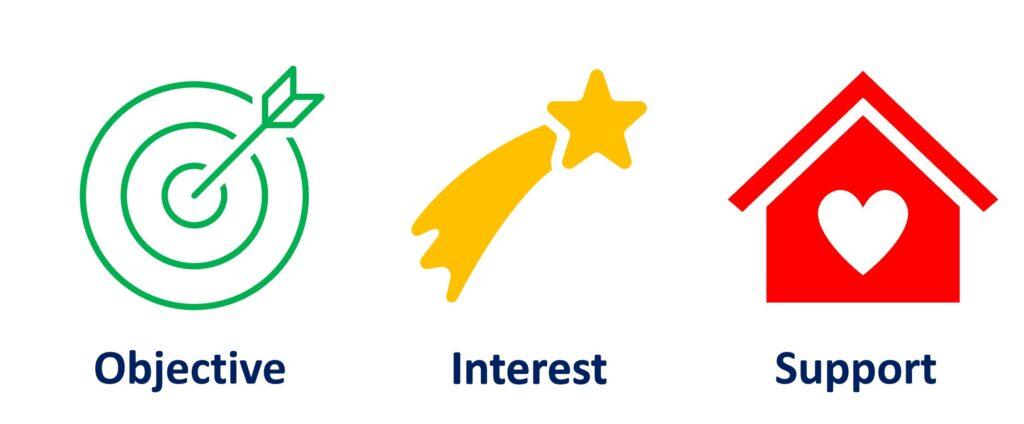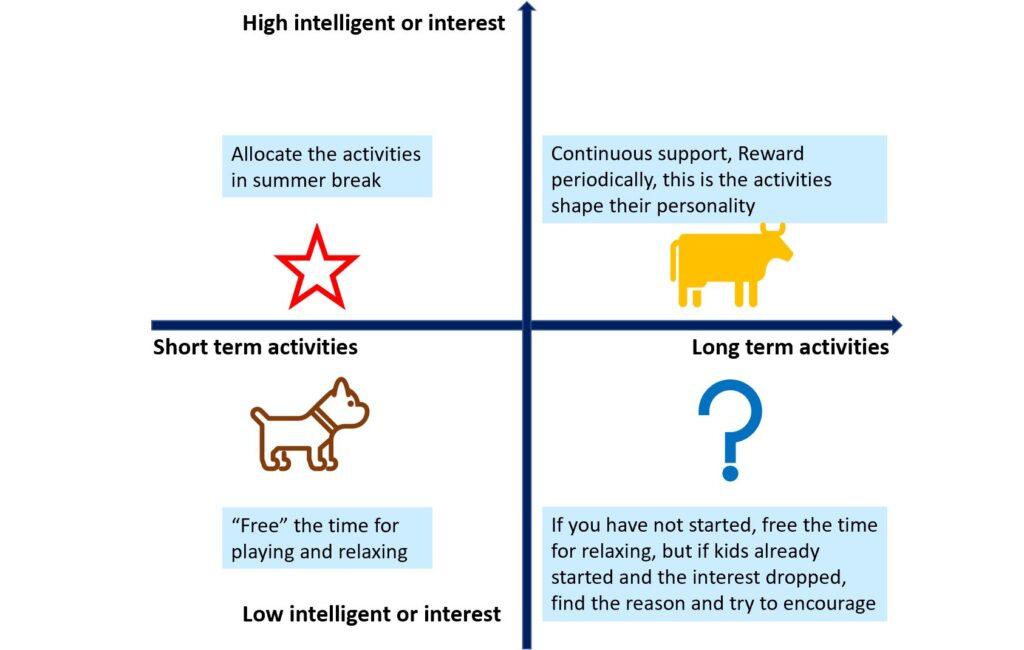Singing, dancing, or piano? Soccer, football, or basketball? Shall both siblings join the art lesson to save one trip? How much involvement is the parent? After school time, most kids go to one or more extracurricular activities. Those sports, arts, languages, music, or STEM programs allow our kids to explore their interests outside the education time, discover their Intelligence, and offer social and physical benefits. However, there are so many options for extracurricular activities, and we, parents, are busy enough already. Do extracurricular activities are worth the energy and spending? There will be matches, competitions, teambuilding, lots of dedicated hours, and parents’ support is needed. Then you have to decide with the kids which extracurricular activities are the most suitable for kids and family. Today we are talking about the 3 general criteria can help parents to choose extracurricular activities for young schoolers.
Related Reading:
- 12 Things can Help Raise Kids with Diversity and Inclusion in Mind
- 10 Best Extracurricular Activities For Young Schoolers
- 10 Ways to Be an Upstanders in Bullying

Table of Contents
The Advantages and Disadvantage of the Extracurricular Activities
There are many benefit of extracurricular activities, below are the main ones.
- It helps kids build skills in different developmental areas
- If kids are playing in teams, they can enhance their teamwork and problem-solving abilities
- Build self-esteem and confidence by learning winning and losing
- Excellent time management and encourage academic performance
- It helps college applications when your kids enter high school
- Enhance diversity and inclusion in kids’ minds by making different friends than school
Besides the advantages, extra curriculum activities also bring many troubles, mainly are:
- It can easily take over family time, especially for siblings attending different activities
- The extracurricular activities demand parents’ involvement, especially sports
- The practice and homework can cause some tension in the family
Related Reading:
- How Long to Practice Musical Instrument Per Week for Kids?
- 11 Tips for a Meaningful Summer Holiday for Both Kids and Teens
3 Criteria to Choose Extracurricular Activities
In our family, we use 3 criteria and discussion to help us decide which extracurricular activities each child will participate in. These questions have assisted us in ensuring that our children’s activities are worthwhile in terms of time, money, and energy, it also teaches our children about the commitment and time management.
When kids are young, we can bring them for as much as possible for the trial lessons, observe their interesting and intelligent. In committee to a lesson, we can discuss with kids and encourage them to participate in decision-making.
Here are the three criteria we ask and discuss in the family:

1) The Goal Setting and Development Direction
- Why do we send kids the activity?
- Do the activities support the characteristic we wish our children have?
- Is the activities a long term or short term (<1 year)?
Besides all the benefits of extracurriculars, such as contributing to students’ academic achievements, character and social development, and community involvement, there are one or two aspects that we would like our kids to focus on. For example, they may join an academic club or learn a new language if they feel not challenged enough at school. Sports are always a good option if you wish them to have a stronger body. When you want them to enjoy music, musical instrumentation also comes to the picture as well.
Sometimes the parents’ childhood and grow path is behind the criteria to choose extracurricular activities. For example, I was a shy girl and easily nervous, and I trained myself very hard to meet the average level when I grew up. For me, knowing the way to express oneself is a “must” skill. Therefore, performance-type extra curriculum such as theatre, singing, magician, circus, and dancing is always my preferred option.
There can be many activities supporting the same development direction. For example, if your goal is to increase physical strength for your kids, then there are various sports for both indoor and outdoor activities. You can pick one or several in different seasons to keep the fun moments.
2) The Intelligence and Interest of Kids
How do the extra curricula activities correspond with our kids’ natural talents, abilities, and motivations?
The natural talent or interest from kids is the second criteria to choose extracurricular activities. Every child is unique and has Intelligence and interests. The extracurricular activities shall correspond with their strengths and passions in helping each child become who they are. For example, my daughter is good at language, competitive, and enjoys the spotlight. Then the debate is more suitable for her than theatre. My son loves sports but does not like to beat others, so grass hockey is more suitable for him than Judo.
Related Reading:
- 8 Type of Intelligence – Every Kid is Gifted
- 6 Signs For a Musically Gifted Kids
- Creative Things to Draw with Chalk
- 8 Youngest Child Traits: Does Birth Order Matter?
Many schools offer extra curricula as after-school activities. Do some homework before the semester to check if the activities are available, and discuss with kids what excites them. Choosing activities that will keep them interested for a long time is good. If they do not know, we suggest contacting his friends to see what they are doing.

How to find kids’ strengths or intelligence?
When we talk about children’s Intelligence, many parents first consider IQ or academic performance in school. Intelligence frequently conjures images of math and science, IQ tests, and complicated algorithms. Each kid has their drive and gifted talents with different development paces. Knowing what kind of Intelligence to help every kid maximize their inherent advantages and highlight the area they need to be more grit to succeed is more important. Dr. Howard Gardner developed the theory of multiple intelligences in his book ‘Frames of Mind-The Theory of Multiple Intelligences. He proposes eight different types of Intelligence to broaden human potential in children and adults, including:
- Musical-Rhythmic Intelligence (music smart)
- Visual-Spatial Intelligence (picture smart)
- Verbal-Linguistic Intelligence (word smart)
- Logical-Mathematical Intelligence (number bright)
- Bodily-Kinesthetic Intelligence (body smart)
- Interpersonal Intelligence (people smart)
- Intrapersonal Intelligence (self-smart)
- Naturalistic Intelligence (nature smart)
Each Intelligence is equally valuable, and each has the potential to be nurtured and strengthened or ignored and weakened.
What is the area you want them to develop?
In addition to kids’ strengths, please identify what you would like them to improve. Use activities as a way to round oneself out. For example, some general social skills can be enhanced by team sports or theater. If you would want them to be more assertive, consider to play an aggressive sports.

3) Family Support and Commitment Level
When all the above criteria are meet, the family support levels became essential to choose extracurricular activities. Depends on the training frequency, distance to the location, cost of training and accessories, private lesson or group lesson, etc.
Related Reading:
- The Pragmatic Tips of Being a Single Parent
- 8 Best Positive and Gentle Parenting Books for Toddlers’ Parents
- The Difference between Bribe and Reward your Kids
- The Cost Overview of Learning Music
- 7 Ways of Teaching Money Concept to Children
Cost
Many extracurricular activities, especially long-term ones, can cost a lot to engage in. Aside from the training fees, sports activities may require you to pay for uniforms and gear. Music classes can cost, and you also need to buy a musical instrument (piano, violin, guitar, flute) and pay the maintenance fees.
Time, Distance, and Training Frequency
Can our kids comfortably finish all their school work and still excel in their extracurriculars? Some extracurriculars, such as teamsports, music and science competitions, are incredibly time-consuming. It is easily take at least 5 hours per week and sometimes, even the whole Saturday including transportation.
Besides, it’s not only the kids’ time that you have to factor in, but also for the parents! Do you have the time to bring your kids from school to their extracurricular classes? Sometimes you need to wait there or pick them up. Some parents, for instance, do not have the luxury of time to fetch their kids from varsity practices. If both parents are working or are single-parent families, maybe a carpool with a teammate or choose an activity at school are the best option.
What kind of commitment can we provide?
Does the activity run for only a few months or to a whole year? Or does it require more commitment such as state competition? There are workshops and camps, such as surfing, reading, writing, speed reading, cooking are running during the summer breaks. On the other hand, there are extracurriculars that your child can continue for years. These activities require serious commitment from both the child and the parents, even though fees are paid monthly or seasonal. These are the ones that don’t just develop your child’s skills in a particular subject matter. And they also build character (discipline and grit) and life skills (time management).
Knowing which activities are only good to take during summer breaks is crucial and which are worth investing in in the long run is vital.
Final Thoughts from Pragmatic Lifestyle
Choosing extracurricular activities doesn’t have to be a nightmare. A few thought-out activities that support each child’s individual interests and abilities, while also corresponding with the Family’s overall values, can be more effective for the child’s long-term well-being.
Your child may already be excelling in one or more extracurriculars. Well done! It may be time to focus on building other strengths or overcoming weaknesses. It’s also possible that your child is getting exhausted from doing too many activities while having to fulfill her school responsibilities. In this case, you might consider dropping some activities that have already fulfilled their purpose. Let the extracurricular activities work for you – in helping to create competent young adults who feel good about themselves and can bless others.
About Me
Hi, there. I am Lin. Together with my husband and two kids, we live in the beautiful Netherlands in Europe. I am dedicated to self-development, creating quality time for the whole family, and fully supporting kids with their potentials with all I have learned from engineering, MBA, and 10+ years of working experience in the energy sector.



3 Comments
Comments are closed.